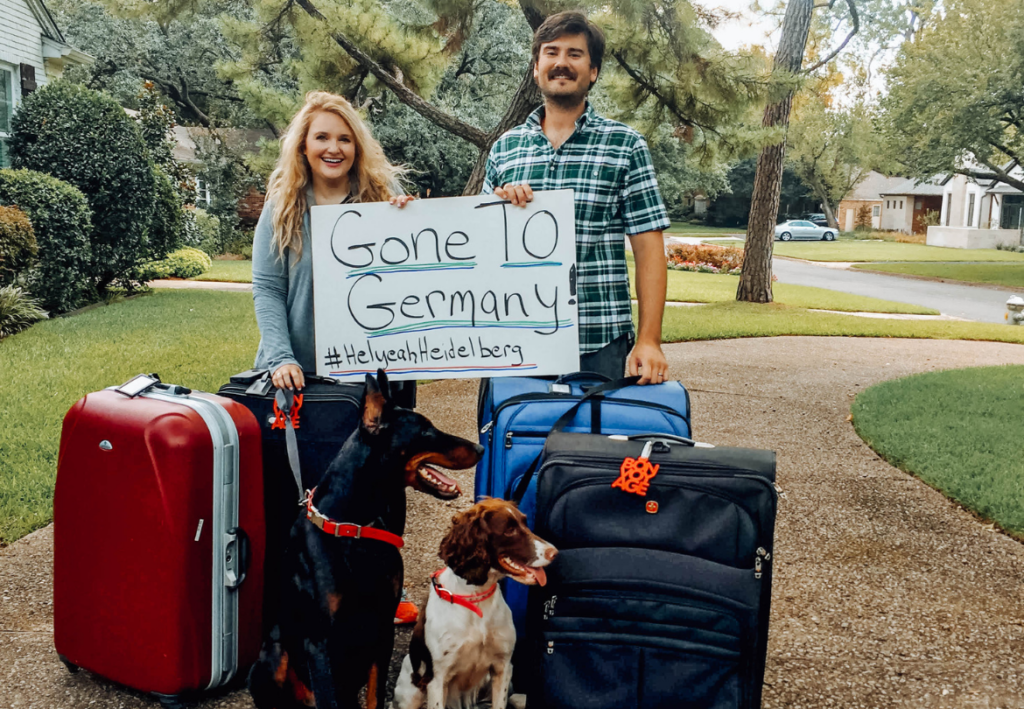So, you want to move abroad.
To Germany!
I have to tell you, you’ve made a good choice. Germany is an excellent place to live.
This gorgeous, livable place is one of the best in Europe. So now that you want to move, this practical guide will help you figure out how to make the move to Germany as a freelancer. I'll also be sharing details about how to move to Germany from the USA, visa process, moving with pets, how much money you need, and so much more. No matter where you're moving from, this post will share what to do before and after your move so you can rest assured you have everything in order.
Buckle up though, it’s not an easy task. But usually, anything worth having is worth working for. Having lived in Heidelberg, Germany for three years I can say this was the right decision for me. It was a long, somewhat difficult process as times, but getting a German visa was well worth it. If you're an American moving to Germany it's a good idea to make sure you understand everything you need and the time it will take.

When I decided to leave the USA and move from my home in Texas to go to Germany, I knew it wouldn’t be a cake walk. I researched a ton of what to do to move as a freelancer to Germany. Often, there was conflicting information or things just didn’t make sense for my needs. So I’m going to try to be as clear and concise as possible to give you all the information you need.
From the visa process, filling out forms, healthcare, housing, and so much more, it’s all in this post. Relocating to Germany is a thrilling and challenging process.
I want to tell you this post is not a story of how I personally moved abroad. This is a practical guide for someone that is ready to make the move or interested to see the process. Of course, I’ll have some tips on what I did that helped. But if you’re looking for more of my story of moving abroad, check out this post.
[toc]
Why Move to Germany
Business Insider states that Germany is one of the best places to live in the world! I have to agree. It’s easy to get around, there’s delicious food (despite what I was told before moving), and it’s an efficiently run country. There’s easy access to travel (planes, trains, and yes, automobiles). Germany is an orderly country with many benefits, good healthcare, and it takes care of its people. It’s not the cheapest place to live but it’s much cheaper than many places in Europe and abroad. Located in the center of Europe makes it a wonderful place to travel from. It’s very easy to get to countries like France, Switzerland, The Netherlands, Belgium, and Italy to name a few.

This also means that German cuisine is influenced depending on where you live. Since I live close to the border of France there is often cuisine from the Alsace region. Also, we get French cheese!
Hopefully, before you’ve made your move, you’ve researched on where you want to live and why you want to live there. If you want a guide or are just starting this process, check out why I moved to Germany, and then to Heidelberg. I map out exactly how we came to this decision and this might help you make your choice.
The German Visa
In order to live in Germany for more than three months (US citizens can stay in the EU for 90 days under the “Schengen” visa) you need to get a visa. Basically, you need a purpose for living in Germany in order to secure a visa. The first hurdle is understanding the types of German visas you’re applying for. The form you’ll fill out is called Fragebogen zur steuerliche Erfassung and when you fill it out it will also generate your tax number. Since you’ll need to pay taxes later on. This form can be filled out online and is about 8 pages. Make sure you understand what kind of visa you’re applying for:
- Gewerbetreibende – Refers to selling a product or service. This means you typically need to register your business as well. This means a bit more work and more forms because you’re registering a business.
- Freiberuflicher – This is a freelancer who does not have to register a business. This usually falls under the category of a blogger (that’s what I do full time), and the definition is anything that falls under scientific, artistic, educational or writing activities. This can be writers, interpreters, pilots, and even doctors. This type of job is classified as self-employed.
Now, when you go to fill out this form, I recommend getting some help from someone fluent in German. It can be very confusing, even if you have a fairly good handle of the German language.
What you need for the visa process in Germany:
- Passport – you need your passport for almost every form you’ll fill out in Germany. You need at least two blank pages on your passport. It also should be issued within the last 10 years.
- Health insurance – as a freelancer you need health insurance. Below I’ll discuss in detail what you need for this. I went with CareConcept and this is approved coverage for my visa.
- Proof of your prior or current residence. For example, we had a utility bill for this.
- Financial plan of your income and earnings – The government wants to make sure you have a valid, income earning business. They also need to know how much you make so they can set the advance amount for the tax payments. You may also list out operating costs (I did), expenses, and projected earnings. They also want to ensure that if you are not consistently earning income (since the freelance world can be fickle) that you have income to live on.
- Description of work – explain thoroughly what kind of business/service you offer. Make sure to specify why you need to be in Germany, and even more specifically, that location (city, village) to do your work.
- Previous bank statements – We needed to show proof of previous bank statements in order to prove financial security. You also have to have substantial savings in your bank account (3-4 months savings) that you can live off of without working. I’ll explain more below.
- References – Often, Germany will want to know your credibility for the move abroad. These people can vouch for you and can attest to your work ability or performance. These can be simple and should just demonstrate that you are equipped to do your job and are a good member of society. It’s even better if you have one from someone living in the country.
- Sometimes you'll be asked to show proof of vocational qualifications. For this, I provided my diploma from my university.
- 2 passport sized photographs
- Visa fee of 60 euros per person. I recommend bringing cash.
If you need additional help or want to find out about types of freelance jobs, check out Existenzgründer.de which is an official resource for startups and freelancers in Germany.
As a freelancer, these things might be asked of you. They were of me, so have them ready:
- Profile of your future business
- Business plan
- References
- Business concept
- Plan explaining your financial requirements for the next year
- Plan on how you plan to finance your business
- Marketing strategy
- Expected income forecast for the next 3-5 years
- Resume
How long is your visa good for? Your visa, once approved, can be granted for a maximum of three years. However, we were only granted one year at a time. This means that we applied every year. It wasn't as lengthy of a process each time though! This is a great site that explains what you need and why you need it for the visa.
Here’s where it’s going to get a bit tricky. I remember that before we moved I read a wealth of information that I should apply for a visa before moving, while others said after. We chose to apply before but because our application was taking so long we had to withdraw our application so we could actually make the move overseas. It’s up to you to decide what is best for you, but here are my recommendations.
Applying for a Visa Before You Move
If you apply for a visa before moving you will need all of the above information, and you will also need a resident address. Since you might not have a permanent residence yet, you can also use a hotel’s address or booking a short term stay. With all your paperwork in order you’ll need to schedule an appointment at the nearest US Consulate’s office. (Find consulates in the USA here.)
Appointments are booked months in advance, so be well aware and book far in advance. At the time, we were living in Nashville, so our closest office was Atlanta, Georgia. Our experience was a bit crazy because we didn’t know that even though I was applying for the freelance visa, we still needed a separate appointment for my husband (since the visa application is for you plus dependents). Luckily, they were able to squeeze us in.
The appointment itself will take about an hour and someone at the office will ensure that you have all the necessary paperwork. They will also take your passport so make sure you don’t have any trips abroad scheduled for the next few months. The process itself of getting approved can take quite a while. If your move is flexible this is a good option. If it’s not, it’s perfectly fine (and even maybe a bit easier albeit a bit riskier if you get denied) to apply in person once you make the move.
Applying for a visa After You’ve Made the Move
Once you make the move, you need to find housing first. This is because you’ll need your housing information in order to apply for a visa. This is called a “Vermieterbescheinigung” and is a verification letter affirming the time of relocation to your new house or apartment. This will also give you your identification number which you’ll need for opening a bank account, setting up electricity, and other important things you need for making the move. Now, you can begin the visa process in Germany. Firstly, you’ll head to your nearby Bürgeramt which is the local registration office to register as a resident.
Next, you’ll apply for the Fragebogen zur steuerliche Erfassung as described above. You’ll need all the above information to apply for the visa. You’ll need to go to the Ausländerbehörde (aka Foreigners' Registration Office) to apply for the visa. To do so, depending on your location, you can schedule an appointment (Google “Ausländerbehörde + city name”). Usually they will take all your paperwork and again the process of securing the visa can take a few months to process.
You'll need to bring in all the paperwork and documents I listed above. It can also help to bring someone fluent in German!

While you are waiting to get your visa approved you can get a temporary visa called “Fiktionsbescheinigung“. This way you can still travel in and out of the country and have the paperwork proving you’re allowed to be in the country.
What To Do If Your Visa Gets Denied
Don’t panic!! It happened to me. My visa got denied. To be honest, it sent me into a tailspin and I was terrified of my next steps. But I hired a lawyer and they helped me through the process. Because I moved abroad and filed as a freelance blogger, this was a bit confusing to the tax office. So, I worked with a lawyer and small business firm in Germany to help me.
We made a business plan mapping out my previous finances as well as projected finances and the importance of WHY I needed to live in Germany in order to carry out my work. This was the crucial part. If your visa gets denied, they will most likely give you a reason for denial. Research the reason why your visa gets denied. If you have the means, hire a lawyer. Lawyers in Germany do not have the same sky high fees we pay in the US, so take a look if someone can help you. A stipulation that applies if your visa gets denied is that you cannot work or do business. That’s why you’re required to have money saved up, so if this happens, you have some money to live on.
Once your visa does get approved you’re ready to live, work, and experience life in Germany!
What to Do Before You Move
Learn some German. I have to admit, I’m not anywhere close to fluent in German. But I did take some classes that helped me understand some of the basics and know some of the frequent phrases or words. You can also take classes in Germany once you move if you want to get a better grip of the language.
Set up Health insurance. I recommend that you set up healthcare before you make the move. Your visa requires that you have a certain amount of coverage, so make sure that you have the right plan that works for you. I went with CareConcept Expat insurance. This is a very cheap plan that basically covers catastrophic care. However, I found this plan worked for me and covered me under my visa. I even had a major accident and had to have surgery in Germany and my plan was great.
There are two types of German health insurance plans: public and private. Public is calculated as 14.6% of your annual salary. This covers most of your healthcare needs. If you’re self employed you can choose public or private but in order to be on private, you have to make at least €59,400 a year. In my years abroad, I find the private health insurance plan to be a bit more expensive when you go to the doctor, but it’s the plan I prefer.
Sell your stuff. Usually, when you move, you get rid of plenty of stuff: clothes, outdated electronics, a spare toaster, kitchen appliances, furniture, etc. When we moved we decided to get rid of almost everything. We moved with just two suitcases each and kept meaningful and a few expensive things at our parents' house. I suggest using eBay to sell your more expensive items that aren’t too bulky to ship and then sell everything else at a garage sale. It was really freeing to get rid of everything.
Make a list of your belongings. Make a list of the items you’re keeping in storage- especially your valuables and important documents. This is especially important if you want to try and find something. When you move things tend to get chaotic. Having a list you can refer to really helps you stay organized.
Ship your stuff. There are companies that help you ship your belongings abroad, or you can use traditional services like FedEx. Remember, this can add up fast, so try to only take what you can’t live without. If you’re like me, sell almost everything, save for a few things you let your parents hold on to (or a trusted friend), and take only two suitcases each. My husband and I moved with just two suitcases and two dogs. We knew our move wouldn’t be forever so we chose to pack light. Looking back, I honestly could have packed less. We could have easily bought a lot of what I brought. You don’t really need to bring 50 pairs of socks. But salsa? They don’t sell the good stuff in Germany. I wish I stocked up on stuff like that instead.
Change your mailing address and have a place where you can send mail. You’ll need to change your address and forward your mail to a new address. We had mail in the US sent to my parent’s address once we had a new address in Germany. We also used the hotel address until we moved to a permanent address. Make sure to update credit cards, monthly payments, etc. of a change in address.
Call your credit card company. I made sure to call my credit card company to let them know I not only was traveling but I was moving to a new country. This way your card won’t get flagged when you go to make payments.
Set up a place to stay such as a hotel or Airbnb. You’ll want to have a place to stay for when you enter the country and new city you’ll be living in. If you don’t yet have a permanent place of residence like an apartment, set up a hotel before you move. This way you can also start filling out paperwork and use the hotel’s address.
Moving abroad with pets. I have a whole post on moving abroad with dogs that will help you make the move. First, check to make sure your pet is not in a banned breed (unfortunate that a list like this exists, but you need to check.) For Germany, they need to be approved by a registered USDA vet along with a health certificate the vet will fill out, have a recent rabies vaccination, a microchip, and are in good health. Since Germany does not have any quarantine laws it’s a much easier process. You need to make sure they have the necessary paperwork, shots, and you’re good to go. It was really a very smooth process once we arrived in Germany. The trickiest part was the plane. Having two dogs not use the bathroom for nearly 10 hours was a challenge but they did wonderfully. We are actually going back to America on a boat which will be nice that they won’t have to control their bowels for such a long time.
Take a photo! You’ll want to remember this momentous occasion so snap a picture of you with your luggage or heading to the airport.

What to Do When You’ve Made the Move
FIRST, you have to register! This is called Anmeldung (or the registration and residence permit) and needs to happen within the first 14 days of making the move. You do this at your local Bürgeramt aka, the resident’s office. Typically the process is quick, but you might have to wait a bit in the queue.
For the residence permit you'll need:
- Passport
- Proof of financing for the next 3 months (they want to make sure you have enough money to live)
- Health insurance
- Passport Photo
- Some cash for them to process the paperwork (I recommend about 200 euros to be safe).
- Place of residence (can be a hotel address)
The process takes 4-8 weeks. After this, you’re given your registration certificate, called Meldebescheinigung. Don't worry if you don't have a permanent residence yet. We used our hotel. As long as you can get mail there, it’s not a problem. MyGermanExpat is an awesome website that will help you with these forms.
Get a phone plan. First things first, you need a working phone. I did a lot of research and found Telekom to have the best plan for our location. There’s also O2 or Vodaphone. We pay monthly for our service which includes data. Make sure to tell your friends and family of your new phone number. I suggest using WhatsApp to stay in touch cheaply.
Set up a German bank account. In order to make many of your purchases and in order to live in Germany, you need to set up a bank account. We went with Deutsche Bank. You’ll need have your passport and proof of address, and some banks will also request proof of regular income.
Find a place to live. I was surprised when finding a place to live was one of the most challenging aspects. We reached out to several real estate companies before we made the move but wouldn't work with us until we lived here.
Heidelberg is a “hot” city with many students and people wanting to live here. Also, the process of apartment and house hunting is very different from my experience in the US. Often, you’ll go on group tours of a house and someone might make an offer on the spot. It took us five grueling weeks (we lived in a hotel with all our stuff and two dogs during that time) to find a place to live, and we looked daily. The best way to find a place is to scour online websites to look for listings. Have an idea in mind of what you want: square footage, kitchen, garden, etc. The best websites to find housing are Immobilien Scout, Wohnungsbörse and ImmoWelt.
Some things to keep in mind while finding a place to live:
- Houses are in prices of hot/cold. Hot is more expensive and the price you'll actually pay because this refers to the price for heating averaged across the entire year.
- Some houses are stripped down to the bare bones. Meaning, no lights or kitchens. Sometimes people take all of this with them. When we moved into our house in Heidelberg they sold us the lights already on the wall. We looked perplexed, but this is typical.
- German housing contracts are very different from those in the US. Usually, in the US you sign a rental agreement for a year. Not in Germany. Your contract doesn’t end. I found this crazy- because the price doesn’t change each year and it’s very hard for your landlord to kick you out! But this is how they do it. So, when we signed a lease, it was never ending, unless we ended it.
- You will need to show proof of your earnings and put down two months (at least) deposit.
Set up internet/TV/Phone. We went with Unity media when choosing an internet provider as well as our phone. We chose not to have TV. But there are many providers that offer package deals.
Set up utilities. You can call your local office Stadtwerke to set this up. You pay this yearly and it’s projected amount based on how much you might use. For example, last year we got money back because we used less heating than projected.
Optional insurance. Germany seems to have insurance and licenses for almost everything. Insurance in Germany is often very inexpensive and there are a few things you might want insurance for to be prepared. There is lawyer or legal insurance or you can also get liability insurance (the most common) called “Haftpflichtversicherung”.
Transportation. Most cities in Germany have great public transportation. You can buy a day pass or monthly pass depending on what you need. The tram system is really wonderful where we live. We thought that we wouldn’t need a car living in Heidelberg, Germany. And it’s true there is fabulous transportation in the city with lots of train connections. However, we travel often and like to take our dogs. We also love to hike. So getting to these more remote places often took too much time. We quickly realized we needed a car. We bought a used car from a dealership and have had almost no issues with it.
I also highly recommend having a bike to get around the city. It’s often times much easier and faster to go by bike than car. We found used bikes on websites like eBay Kleinanzeigen. It's also a great website to purchase things like couches or other items locally.
Register for Amazon.de. I don’t know what we would have done without Amazon and having Amazon Prime in Germany is highly necessary. We found much of our household items and essentials on Amazon and it was great to have them delivered to our door.
Go explore! Now that you live abroad, it’s time to explore your new home! Don’t forget to check out the local markets and get to know your new city. Try some German restaurants, walk around without a map, go to the highest point in the city and survey your new home.

Paying Taxes in Germany
Not the most fun subject but now that you live abroad, you have to pay taxes. We pay taxes in Germany and in America, since we are required to pay the small business (or self employed) portion of taxes. Yes, it hurts every year.
I highly suggest hiring an accountant. All of the tax forms are in German and can be a bit confusing. The tax accountant can ensure you're following all the rules and that your understanding exactly what you need to pay. We got audited our first year and I’m so glad we had an accountant help us through the process. It ended up being not much of a headache because of the accountant. I suggest hiring someone that is familiar with freelancers and/or the US taxes.
Remember that form (Fragebogen zur steuerliche Erfassung) you filled out to register as a freelancer? When you did this a tax number was created for you. This is what you need when you go to pay taxes in Germany. Make sure your finances are in order to see what you might need to pay. You might have to pay VAT, even as a freelancer. If you make more than €17,500 from people in the EU then you need to be charging VAT tax. This site can help you understand paying taxes in Germany.
Paying taxes in the US. If you’re a small business or self employed you’ll need to pay self-employment tax in the USA. This is typically all most freelancers have to pay. But there are some times that you will pay more than this such as property tax if you’re a home owner or if your income exceeds over $102,000 (note, this figure changes each year so check the amount.)

FAQs about moving to Germany
What’s Hard About Moving Abroad?
German bureaucracy is tough. There is a lot of jargon when you go to fill out forms, waiting in lines, going to specific offices which have even more specific hours. Mix that with a foreign language and it can be hard to get used to. You’ll miss your friends, family and comforts of home. I always miss my local Tex Mex restaurant, shopping at Target (even Walmart), or going to Chick-Fil-A.
You have to get used to the German way of life and culture. Germans have a reputation for being a bit cold and direct. I found this to be very true. This doesn’t mean that they don’t mean well. This is just a cultural difference. They really don’t like it when you cross the street at a red light (even if no car is in sight). They are typical rule followers and often call you out if you break one, even one that might seem harmless. Check out my post on what I’ve learned about Germans since living in Germany for more insights.
How to Move Abroad with My Husband? Single?
You need a visa if you want to work in Germany. Therefore if you have dependents they will be covered on your visa. For instance, I got the freelance visa so this covers both Michael and I. If you were to move alone, you would just need a visa for you. With kids, you just need to secure your visa and your dependents are covered.
How to Make Friends?
Making friends as an expat was a daunting task. I work from home with my husband, how would we ever meet people?! Well luckily, there are wonderful programs like Meetup and Internations. Essentially, you sign up and can find parties, special interest groups, and events happening in your area. When we first moved I joined a “writers meetup.” We met at a coffee shop and discussed our books or what we were working on. I also found the Internations events to be where we found some of our closest friends. The events usually take place at a bar, and they make an announcement via email. From here you can RSVP and you show up and join in on the fun. Sometimes you pay a small fee to attend and you typically are given a drink or food if so. I find this is a great environment to meet other adventurers, expats, and people interested in living abroad, travel, or who have similar interests. I also made friends with people from around the world I might not have met otherwise.
Do you need to know German before moving?
Nope. To be honest with you, my handle of the German language is extremely poor. It should be much better than it is! But it’s not. I live in Heidelberg and everyone speaks nearly perfect English. This isn’t to say it’s the same everywhere in Germany, but they are very good at English. I did take some classes before moving and when I first moved. Looking back, I wish I learned more of the language. BUT, it’s definitely not necessary before moving.
What are some other ways to get a German visa?
Of course, there are many ways to get a visa. Some much, much easier.
- Move over with a job – this is a beautiful, wonderful thing where a company will move you over. Most of our friends did this and I sigh with jealousy as they explain how their company paid for their couch to be moved over and there are no messy visa situations.
- Look for a job in Germany. Check out this website to see some openings and options.
- Become and Au Pair – This is a great way to make a temporary move
- Study the language – If you enroll at least 18 hours a week in German language courses you can move.
- Be a student – If you study in a program you can live in Germany or elsewhere in Europe for the length of the program. You will need your admission or registration certificate from the university to show that you are enrolled.
How Much Money Did You Save Up To Move Abroad?
We saved up around $45,000 before we made the move. This is not savings. This is something separate that we wanted to have in case of emergencies and for travel.
How Do You Make Money as a Freelancer?
In case this wasn’t clear, since I’m often asked this, I make money full time, from this blog. I have been or a number of years and I was able to prove that it’s a viable financial income for my life and both myself and my husband.
What If I Want to Make the Move Permanent?
In order to do that you need to have a residence permit for 5 years, know German, and have a work permit. You will not lose your U.S. citizenship.
I hope this post helps you move abroad to Germany, secure a visa, or just have a better understanding of what it’s like to live in Germany! If you have any questions feel free to reach out or leave a comment below.
I'd love it if you followed more of my story of life abroad and travel on Instagram, @heleneinbetween!
Some other blog posts you might like:
What I Love About Living Abroad
What I Hate About Living Abroad
What to Do in Heidelberg, Germany














